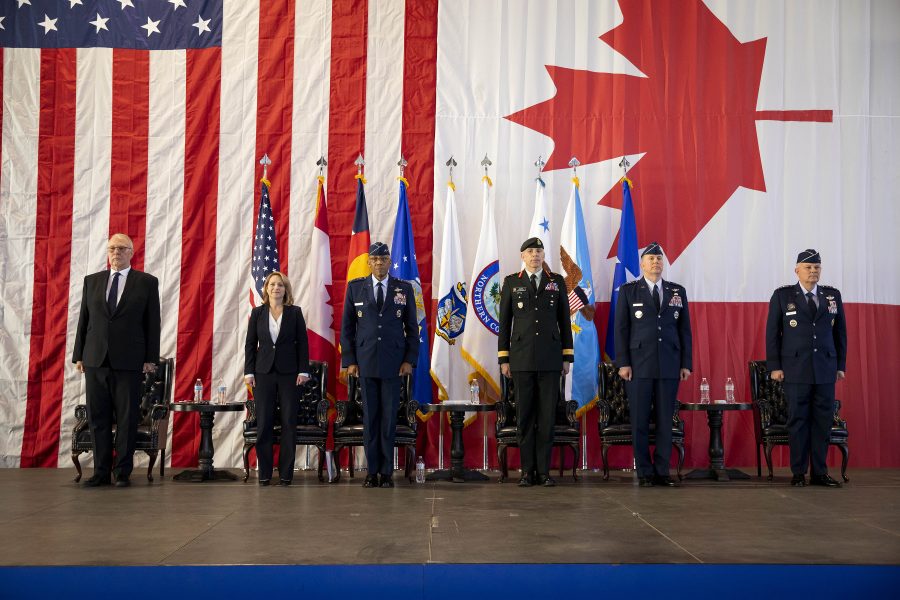Air Force Gen. Gregory M. Guillot took the helm of North American Aerospace Defense Command and U.S. Northern Command during a ceremony at Peterson Space Force Base, Colo., on Feb 5. Succeeding Gen. Glen D. VanHerck, Guillot is now responsible for the 24/7 homeland defense mission.
“NORAD and NORTHCOM and their complementary missions are more imperative today than ever before,” Guillot said at the ceremony. “We owe the American and Canadian citizens that depend on us a relentless, disciplined approach to defending our homelands in all domains from all avenues of approach against all who intend us harm. Delivering that defense in today’s challenging environment is our commands’ no-fail mission.”
That mission is only growing tougher, Guillot said, in the face of competitors’ increasing capabilities.
“Today, the United States and Canada face an extraordinarily complicated and quickly changing strategic environment,” Guillot said. “Competitors can hold North America at risk in multiple domains from all avenues of approach and are increasing both their capability and their capacity to strike the homeland, either kinetically or non-kinetically, at a rate far exceeding the pace seen just a few years ago.”
Deputy Secretary General Kathleen Hicks echoed Guillot’s sentiment, citing Russia’s long-range aviation capabilities, North Korea’s growing ICBM program, and the Chinese surveillance balloon from last year as examples. Gen. Wayne Eyre, Chief of the Defence Staff for the Canadian Armed Forces, also stressed that competitors’ efforts have escalated over the years.
“Our competitors have become bolder, more active in this space, not just Russia, but China, too, acting on its aspirations of global preeminence,” Eyre stated.
To combat those threats, Guillot and Chairman of the Joint Chiefs of Staff Gen. Charles Q. Brown Jr. stressed the need for robust partnerships and collaboration.
“To the men and women of NORAD and NORTHCOM who deepen our partnership every day, thanks for your dedication, thanks for your sacrifices you all make to strengthen our shared security.“
NORAD, founded in 1958, is a bi-national organization for aerospace warning, aerospace control and maritime warning for North America. NORTHCOM, established in 2002, is focused on homeland defense and providing military support to non-military authorities when directed.
The homeland defense mission gained renewed focus after the Chinese spy balloon incident in early 2023, and VanHerck cited the incident before Congress in pushing for better domain awareness technology to cover “gaps.”
In his farewell speech, VanHerck once again pushed for more resources to tackle the problem.
“To execute our assigned missions, NORAD and NORTHCOM require improved and increased domain awareness, adequate infrastructure, and access to trained, ready, and equipped forces,” VanHerck said.
In particular, he called for global integration across the Department of Defense and modern technologies to enhance awareness and information processing.
“We must process this domain awareness and information more quickly and get it to our decision-makers,” VanHerck said. “The only way you create more time and decision space is you process data and information with the use of artificial intelligence and machine learning and distribute it faster, allowing key deterrence options to be developed, and defeat options, if required.”
VanHerck also used his address to call for lawmakers to take the homeland defense mission more seriously through consistent, stable funding.
“I am concerned for our nation; a divided nation leading to an inability to focus on strategic imperatives and threats,” Vanherck asserted. “Continuing resolutions and the failure of Congress to pass a budget on time in 13 of the last 14 years, hollow promises that don’t equal tangible investments in support of the stated number one priority of homeland defense.”
Now, VanHerck will pass the mantle of leadership on to Guillot after a 36-year career in the military and almost four years at NORAD and NORTHCOM. Guillot comes to the job after stints as deputy commander of U.S. Central Command and head of Air Forces Central, but prior to that he was director of operations at NORTHCOM. He also spent time in Pacific Air Forces and commanded at the wing and squadron level.
